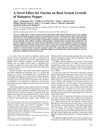63 citations,
September 2020 in “Frontiers in Microbiology” Probiotics show promise for health benefits but need more research to understand how they work.
 June 2001 in “International Journal of Cosmetic Surgery and Aesthetic Dermatology”
June 2001 in “International Journal of Cosmetic Surgery and Aesthetic Dermatology” Finasteride improves hair growth in men with androgenetic alopecia.
 16 citations,
September 2018 in “Journal of Ethnopharmacology”
16 citations,
September 2018 in “Journal of Ethnopharmacology” Plant-based remedies may treat hair loss by reducing inflammation and improving insulin resistance.
 40 citations,
January 2010 in “Indian Journal of Dermatology, Venereology and Leprology”
40 citations,
January 2010 in “Indian Journal of Dermatology, Venereology and Leprology” Certain diets can affect skin conditions, but more research is needed to understand these relationships fully.
 November 2023 in “International journal of biology, pharmacy and allied sciences”
November 2023 in “International journal of biology, pharmacy and allied sciences” Herbal treatments can help with hair problems, but more research is needed.

There are many ways to treat Polycystic Ovary Syndrome, including lifestyle changes, surgery, and various medications, but more research is needed for better treatments.
 January 2020 in “Asian journal of applied science and technology”
January 2020 in “Asian journal of applied science and technology” Good nutrition is crucial for health and preventing disease, and supplements can help prevent nutrient deficiencies.
 140 citations,
February 2020 in “Frontiers in Plant Science”
140 citations,
February 2020 in “Frontiers in Plant Science” RNAi-based biopesticides could be safe and effective for pest control with careful development and risk assessment.
 14 citations,
November 2020 in “International Journal of Biological Macromolecules”
14 citations,
November 2020 in “International Journal of Biological Macromolecules” Mushroom-based scaffolds help heal skin wounds and regrow hair.
 391 citations,
November 2015 in “Journal of Clinical Lipidology”
391 citations,
November 2015 in “Journal of Clinical Lipidology” The guidelines suggest lifestyle changes, diet adjustments, and personalized medication to manage dyslipidemia and reduce heart disease risk.
 43 citations,
August 2010 in “Expert Opinion on Investigational Drugs”
43 citations,
August 2010 in “Expert Opinion on Investigational Drugs” Inhibitors of 11β-HSD1 show potential for treating type 2 diabetes but require more testing for safety and effectiveness.
 51 citations,
November 2005 in “Journal of Medical Primatology”
51 citations,
November 2005 in “Journal of Medical Primatology” Alopecia in captive rhesus macaques is affected by season, sex, age, housing, and stress, with complex links between stress hormones and hair loss.
 May 2024 in “KIU journal of health science”
May 2024 in “KIU journal of health science” Kolaviron and quercetin may help treat prostate issues.
 14 citations,
November 2013 in “Journal of the American Society for Horticultural Science”
14 citations,
November 2013 in “Journal of the American Society for Horticultural Science” Glycine slows main root growth but boosts root hair growth in habanero peppers.
 55 citations,
September 2017 in “Expert Opinion on Drug Discovery”
55 citations,
September 2017 in “Expert Opinion on Drug Discovery” Different factors affect where drugs are absorbed in the small intestine, which is important for effective medication use.
 193 citations,
January 2015 in “International journal of trichology”
193 citations,
January 2015 in “International journal of trichology” Dermatologists need to understand hair products to treat hair and scalp issues better.
 January 2021 in “Middle East journal of applied sciences”
January 2021 in “Middle East journal of applied sciences” Zinc is essential for plant growth and human health, but many soils lack enough zinc, affecting crops and potentially leading to health problems.
 32 citations,
August 1999 in “Journal of Investigative Dermatology”
32 citations,
August 1999 in “Journal of Investigative Dermatology” Early onset hair loss linked to genetics and androgen levels.
 926 citations,
June 2010 in “BMC Medicine”
926 citations,
June 2010 in “BMC Medicine” Polycystic ovary syndrome is a complex condition that affects women's mental, reproductive, and metabolic health throughout their lives.
 11 citations,
January 2008 in “International journal of environment and health”
11 citations,
January 2008 in “International journal of environment and health” Children are at risk of health issues from exposure to platinum group elements from car exhausts.
 8 citations,
December 2021 in “International Journal of Family Studies, Food Science and Nutrition Health”
8 citations,
December 2021 in “International Journal of Family Studies, Food Science and Nutrition Health” Extra virgin olive oil may boost the immune system and help fight infections like COVID-19.

Researchers found a genetic link for hereditary hair loss but need more analysis to identify the exact gene.
 March 2017 in “Fundamental & Clinical Pharmacology”
March 2017 in “Fundamental & Clinical Pharmacology” The model and estimator can predict drug exposure in kidney transplant patients well.

Ganoderma lucidum extract promotes hair growth in bald rats, with higher doses producing better results, similar to the effects of Minoxidil 2%.
 May 2024 in “Journal of functional foods”
May 2024 in “Journal of functional foods” Coffee bean residue extract helps hair growth by activating cell processes.
 95 citations,
February 2018 in “Dermatology and Therapy”
95 citations,
February 2018 in “Dermatology and Therapy” Nutraceuticals may improve skin health and protect against aging, but more research is needed on their optimal use and possible health risks.
 January 2024 in “Tropical journal of pharmaceutical research”
January 2024 in “Tropical journal of pharmaceutical research” Cirsium japonicum var. spinossimum seeds may help reduce inflammation and fight cancer.
February 2024 in “Cosmetics” The conclusion is that new plant-based treatments for hair loss may work by targeting certain enzymes.
 September 2020 in “Nature, Environment and Pollution Technology/Nature, environment and pollution technology”
September 2020 in “Nature, Environment and Pollution Technology/Nature, environment and pollution technology” Eating plants from polluted areas can cause liver and kidney damage in rats due to toxic metals.
 June 2021 in “Journal of emerging technologies and innovative research”
June 2021 in “Journal of emerging technologies and innovative research” Onion and Aloe vera can help protect hair from damage caused by hair dyes.



























